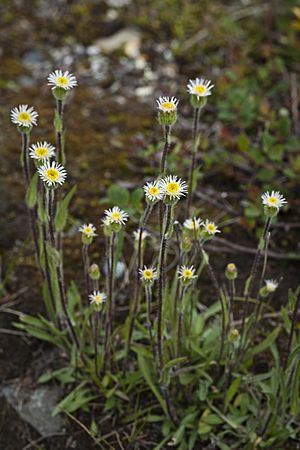Shortray fleabane facts for kids
Quick facts for kids Shortray fleabane |
|
|---|---|
 |
|
| Denali National Park and Preserve, Alaska | |
| Conservation status | |
| Scientific classification | |
| Genus: |
Erigeron
|
| Species: |
lonchophyllus
|
| Synonyms | |
|
|
The Shortray Fleabane (scientific name: Erigeron lonchophyllus) is a type of flowering plant. It belongs to the daisy family, just like sunflowers and dandelions! People often call it "shortray fleabane" because of its small flower parts.
About the Shortray Fleabane
This plant is found in many places across Asia and North America. It's a common sight in its native areas. The Shortray Fleabane is known for its pretty, small flowers.
Where the Plant Grows
The Shortray Fleabane naturally grows in North America. You can find it in most of Canada, except for the four Atlantic provinces. It also lives in the western and central parts of the United States.
Beyond North America, this plant is found in many parts of Asia. This includes places like Siberia, Mongolia, Xinjiang (a region in China), Kazakhstan, and Iran. It likes to grow in damp areas and places where the ground has been disturbed.
What the Plant Looks Like
The Shortray Fleabane can be an annual or biennial plant. This means it either lives for one year or two years. It grows to be quite small, usually between 2 and 60 centimeters tall (about 0.4 to 24 inches). Its stem can be a bit hairy or bristly.
The leaves at the bottom of the plant can be up to 8 centimeters (3.2 inches) long. As you go up the stem, the leaves become smaller. The plant produces one to twelve small flower heads. Each flower head is like a tiny bouquet.
These flower heads have hairy, purple-tipped parts called phyllaries around the outside. Inside, you'll find up to 130 tiny, hair-like white or pink ray florets. These are the "petals" you see, and each one is only 2 or 3 millimeters long. In the very center of the flower head, there are many yellow disc florets.


